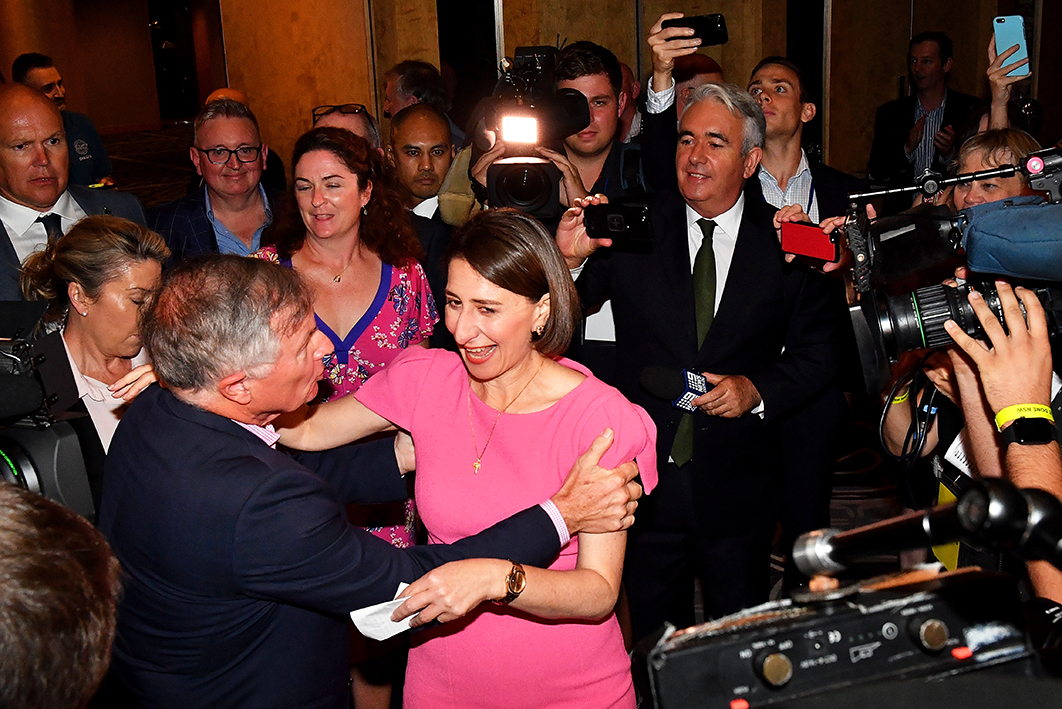Yesterday’s election victory for the government of Gladys Berejiklian was no small achievement. Returned for a third term, the Coalition’s relatively minor losses came chiefly in rural areas where the Nationals were felt to have neglected the voters they exist to represent.
Berejiklian’s swift rise to the premiership a little over two years ago came after the unexpected resignation of Mike Baird. Baird’s popularity had plummeted in the wake of his decisions to amalgamate local councils and ban greyhound racing, both of which were seen as factors behind the Nationals’ surprise loss of the previously safe seat of Orange to the Shooters, Fishers and Farmers Party at a November 2016 by-election.
The new premier’s astute damage control largely neutralised the issues that had brought Baird down and arrested the decline in the government’s fortunes. Nonetheless, Berejiklian’s term was punctuated by a series of difficult by-elections, which were a continuing distraction and destabilising factor. In April 2017, the Liberals narrowly retained the seats of North Sydney and Manly. In October of that year the Nationals survived big swings against them in Cootamundra and Murray. The Wagga by-election in September 2018 saw the previously safe Liberal seat fall to an independent.
A major miscalculation that would haunt Berejiklian throughout this year’s campaign was the decision to demolish and rebuild the Allianz and ANZ stadiums. Although she partially backed off, announcing the ANZ Stadium would be refurbished rather than demolished, the issue fuelled a perception that the government was out of touch with the concerns of ordinary people.
Berejiklian herself is generally acknowledged to be decent, sincere and hard-working, and to possess high-level administrative skills. Although she lacks Baird’s charismatic charm, she has clearly convinced wavering voters that she is trustworthy and competent.
Less well known, of course, was opposition leader Michael Daley. Elected on 10 November 2018, Daley was thrust almost immediately into an election campaign. But it is worth recalling that his predecessor, Luke Foley, had even less time to prepare for his first campaign as leader, taking the job less than three months before the 2015 election. Foley performed more impressively than Daley against a tougher opponent, Baird, and achieved a two-party-preferred swing to Labor of 10 per cent.
From the beginning, Daley showed an uncertain grasp of issues, stumbling a number of times over details of key policies, most disastrously in a televised debate with the premier on the eve of the poll. The government used allegations of improper conduct by Daley while on Randwick Council to identify him with the scandal-ridden final years of the previous Labor government. It seems likely that the release in the last week of the campaign of a tape of Daley making negative comments about Asian immigrants blunted any momentum he had achieved.
Labor’s largely lacklustre campaign fired briefly when Daley attacked powerful broadcaster Alan Jones over the demolition of Allianz Stadium. But the opposition’s preoccupation with this issue was a mistake, and came at the cost of a failure to project a positive and attractive alternative policy vision.
One traditional analogy for the fall of a government is that of a bus. All the opposition has to do is follow the government’s bus, picking up and comforting passengers when they fall out as it hits a bump or negotiates tight corners. The longer the bus is on the road, the more passengers it loses. This was basically the opposition’s strategy: Daley was hoping that the dissatisfactions and resentments that inevitably accumulate the longer a government is in office would cause voters to elect Labor.
What Labor forgot is that governments can change course and entice passengers back on board, particularly if these passengers are not at all sure that the opposition would give them a smoother ride. Here lies the key to the result: Berejiklian was able to persuade enough voters that the government not only had significant achievements to its credit, particularly in finance and infrastructure, but also still had something to give. Dissatisfaction certainly existed, but Labor failed to convince the electorate that it was the better alternative. •




